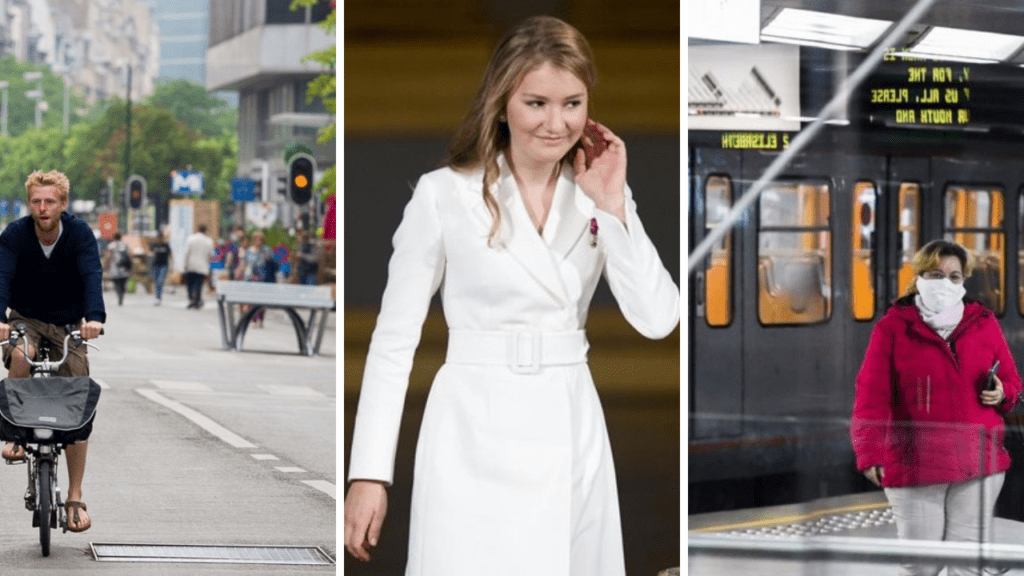While the approaching Phase 4 heralds life almost returning to normal in Belgium, some rather substantial changes - such as added safety distance in everyday life - keep things squarely in the new normal.
In Brussels, for instance, the announcement of the Region's has plans for 10 (out of a total of 50) low-traffic zones will impact life from the City of Brussels to Forest. The low-traffic zones will create extra space for pedestrians and cyclists, and will take the focus off of cars, with the goal to make Brussels a greener city.
However, as many Brussels residents have now indicated that the coronavirus has made them afraid to use public transport, it remains to be seen how many cars will actually be left at home.
So, what else is new? The Belgian crown princess has made headlines for her clothing style again, the High Council for Justice will make fighting sexual violence an absolute priority, and the latest figures show that the coronavirus epidemic is slowing down.
With so much information, and so little time to catch up before it potentially changes again, here are some of the top stories from around the country to get you up to speed.
Belgium in Brief is a free daily roundup of the top stories to get you through your lunch break conversations. To receive it straight to your inbox every day, sign up below:
1. Brussels announces first 10 low-traffic districts
On Thursday, the Brussels Region announced the first 10 districts that will take the focus off cars, to create more space for pedestrians and cyclists, as part of its Good Move plan.
Starting from September, Brussels Mobility will guide five municipalities wishing to introduce low-traffic areas or neighbourhoods.
First, a multimodal mobility study will be conducted, followed by the implementation of measures on the ground. Read more.
2. Virus experts explain: what were the first warning signs?
Medical experts raised the alarm in January regarding the shortage of face masks and other personal protective equipment (PPE) for hospitals should the coronavirus, then spreading in China, should reach Belgium. But politicians failed to respond.
That was just one of the claims made in a VRT programme shown on Thursday evening, which brought together seven major figures to discuss the beginnings of the crisis and the way it was handled. Read more.
3. Brussels residents ‘afraid’ to use public transport
Brussels residents are increasingly turning away from public transport in the aftermath of the coronavirus lockdown, a new mobility report found.
A new barometer by road safety institute VIAS found that the use of cars or bicycles to get around was rising at the same time as public transport use decreased.
The figures showed that the use of the tram and metro networks dropped sharply, going from 9.5 to 2.7% after the lockdown. Read More.
4. Vogue names Belgian Elisabeth among world’s most stylish princesses
Belgian Princess Elisabeth has been named among the world’s most stylish princesses by the British edition of the Vogue fashion magazine.
The 18-year-old Belgian crown princess’s clothing style is comparable to that of Kate Middleton, the Duchess of Cambridge, according to Vogue.
“She regularly wears feminine designs from Belgian designers, as well as belted dress-coats for formal events, with subtle jewellery and matching accessories to off-set her looks,” the magazine said. Read More.
5. Fighting sexual violence prioritised by High Council for Justice
The High Council of Justice (HCJ) has issued a report calling for the justice system to make an “absolute priority” of the matter of sexual violence.
“The HRJ notes that there is a lot of goodwill within the judiciary, but there is no integrated policy on an approach to sexual violence,” the report concludes. And it makes three recommendations. Read more.
6. Belgium's epidemic is slowing down
An average of 89 people per day tested positive for the new coronavirus (Covid-19) in Belgium, according to figures by the Federal Public Health Service on Friday.
The total number of confirmed cases in Belgium, since the beginning of the pandemic, is 61,106. The total reflects all people in Belgium who have been infected, and includes confirmed active cases as well as patients who have since recovered, or died from the consequences of the virus.
An average number of 89 people per day tested positive for the virus over the 7-day period from 16 to 22 June. The trend decreased by 6% compared to the daily average of 94 new infections the week before. Read more.
7. Segways may be gone, but tours in Bruges will go on
The Segway, a two-wheeled battery-operated scooter invented in 2001 and marketed as a personal transporter, is to stop production, the Chinese manufacturer Ninebot said.
Ninebot took over the company in 2015, by which time the vehicle had acquired a somewhat comedic reputation.
Segway was difficult to ride, depending on the rider leaning forward or backwards to accelerate and decelerate, all the while maintaining balance.
However, the end of the Segway is not the end of Segway tours. Read More.
Maïthé Chini
The Brussels Times



